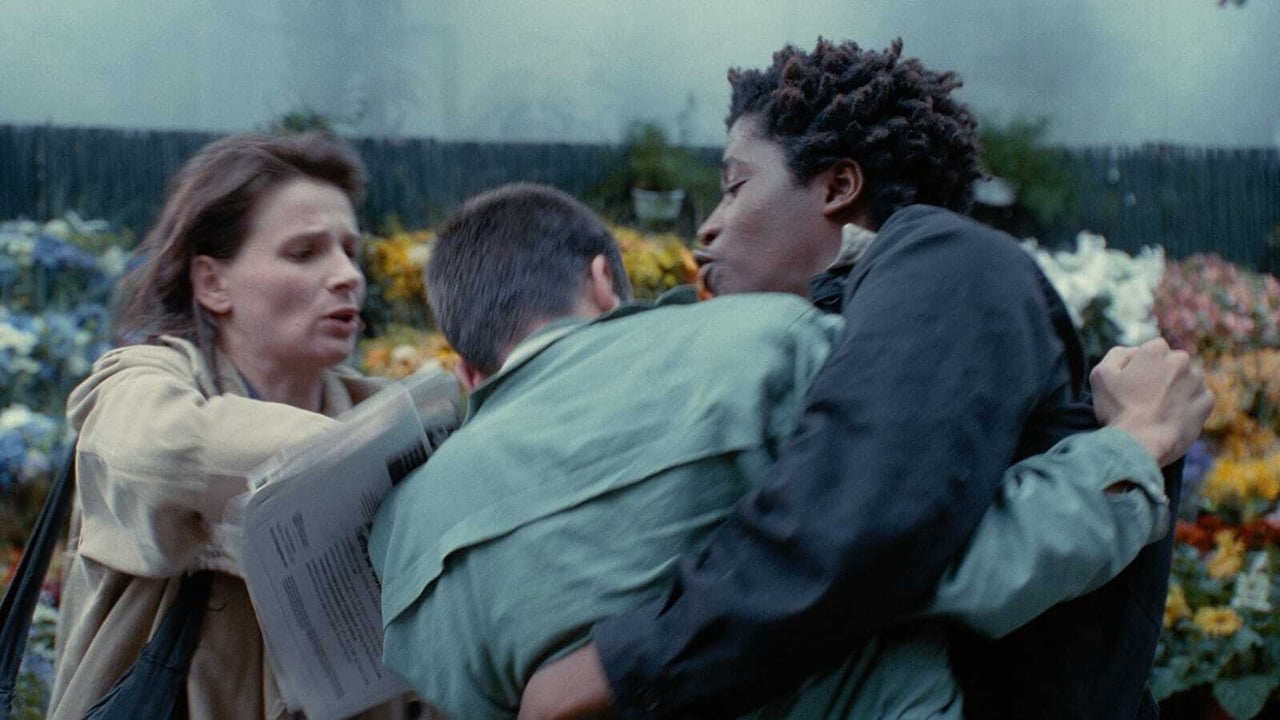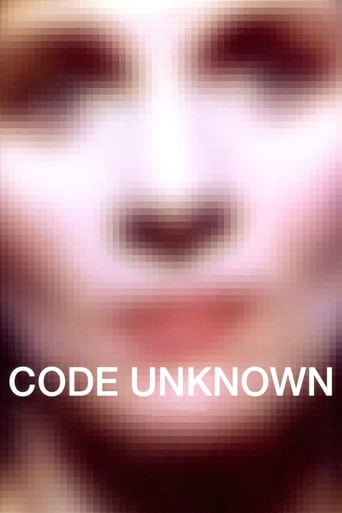BlazeLime
Strong and Moving!
Skunkyrate
Gripping story with well-crafted characters
Yash Wade
Close shines in drama with strong language, adult themes.
Geraldine
The story, direction, characters, and writing/dialogue is akin to taking a tranquilizer shot to the neck, but everything else was so well done.
Graham Greene
Code Unknown; Incomplete Tales of Several Journeys (2000) is another of director Michael Haneke's deeply austere and emotionally rigid intellectual probes into the human condition; and the various psychological elements that cause problems, not only in our personal lives and relationships, but in a broader, sociological sense as well. At this point it is perhaps worth noting that the film's essay-like subtitle alludes to the style of the film, which involves a number of long, unbroken shot compositions (some longer than ten minutes) that often end abruptly, with no real sense of resolution.Presented as a series of loosely connected vignettes that focus on the idea of character interaction as opposed to narrative direction, Code Unknown is a difficult film to appreciate, at least at the level that many of us would probably approach it. One of the main focus points here is the idea of perception; how both we as an audience and the characters in the film perceive the action unfolding from the limited point of view that we've been given. Some good examples of this would include the lengthy and suitably tense scene early on in the story; in which a number of unconnected characters all come together through a seemingly mundane event that ends with a scuffle erupting between a white teenager and a young black man, resulting in both men - and the various onlookers - being arrested. Later, midway through a particularly disconcerting scene, a toddler playing on the balcony of a high-rise apartment slips, all the while watched with horror by his terrified parents who are powerless to do anything. Then finally, towards the end of the film, we watch in eager suspense as a young Arab boy harasses Juliette Binoche's character on a Parisian metro. Throughout the film and these sequences in particular we expect something spectacular and thrilling to happen but it never seems to arrive, until, of course, we realise that 'something' is happening.As with his most recent film, the highly acclaimed Hidden (2005), there are a number of interesting sequences in Code Unknown, which, on basis of description alone, could easily lead one to believe that they are about to watch a tense, Hollywood thriller. The film obviously couldn't be further removed from this ideal, however, with Haneke once again offering us a dour, colourless psychological study, in which characters crash into one another almost at random and cause a ripple effect that disrupts the order of everything that came before. Clearly, Code Unknown is unconcerned with thrilling the audience, at least, not in the typical sense; with the film never allowing the dramatic tension to build to anything beyond the confines of these various character vignettes that are strung together one by one in order to build up the story. This is a film that wants to enlighten with a raw depiction of everyday life; taking the viewer from moments of deadpan humour (albeit, incredibly low-key humour) to scenes that evoke a feeling of almost crippling desperation. Once again, these techniques are used to mislead the audience into thinking that the film is heading in a different, very "non-Haneke-like" direction, before switching track and confounding us all over again. If you give it some time to really get going, then the results can be oddly thrilling, and - in my opinion - probably more enjoyable and satisfying overall than anything else Haneke has directed.Still, the film does have that sense of screaming polemic that much of the director's previous work has occasionally descended into; with the loose ends and the experiments in cinematic formalism creating a cold and intellectual exercise that will naturally turn many potential viewers away. A real shame too, because regardless of these distancing intellectual experiments, the direction, photography and acting are superb throughout, and - like The 7th Continent (1994) and Funny Games (1997) - help to weave together a beguilingly tense tapestry of guilt, anger, misery and social despair.
MartinHafer
...because on the DVD case, one critic stated that this film was "one of the top 5 films of the year". Considering how dull and uninvolving the film was, then it was a poor year indeed. Now this isn't to say it's a horrible film--just one that is difficult to connect with or care about in any deep way. The film appears to be about interpersonal communication and it seems to take the approach that people are disconnected by actually making the film itself disconnected and disjoint. Yeah, whatever. All I know is that I couldn't wait for the film to end and it's one of the duller French films I've ever seen.As for the story itself, it's a bunch of segments involving people who occasionally intersect with those in other segments (such as the one involving the awfully selfish teen and the well-meaning Malian man). The problem is that there were no segues--just cuts to the next unconnected vignette. Additionally, the lack of emotion in most of these segments made the whole experience tedious. I really wish the films' makers had taken some of the better sequences and just hashed them out more instead of making a film that overall just doesn't satisfy.FYI--As an American who is rather fluent in sign language, I was surprised how very difficult it was to understand what the deaf kids signed in the film. This was especially surprising since American Sign Language is directly descended from the French. Non-signers might feel put off that SOME of the signing in the film was not captioned and most would have no idea what the kids were saying at the end of the film. However, it was really amazing and catchy to hear their drum corps--it had an infectious energy.
emeiserloh
Both have similar themes. They both deal with the psychological and communicative dysfunctions particular to our modern, multicultural world. Both films also deal with the suffering we create through our behavior toward one another by way of our assumptions, beliefs, and prejudices. Stylistically, however, these two films have little in common. Whereas "Crash" plays like a pilot for a TV series, weaving its characters and their stories together in support of its themes (holding our hands throughout and taking us where it wants us to go), "Code Unknown" is a puzzle in fragments that we must assemble ourselves from the information we are given. Whereas "Crash" connects too many improbable conversations and events with possible ones in order to hit us over the heads and wrench our hearts with its message, "Code Unknown" entrusts us with cinematic clues and metaphors that we must use to construct our own understanding. In "Crash" everyone tells us everything they feel and think thereby limiting the possibilities of what we are allowed to imagine. To the contrary, "Code Unknown" invites us to rely our own abilities (as perceivers) to discover what truths there are."Crash" has a few brilliant scenes, but once we have seen it there is nothing left to experience, wonder about, or really discuss. The show is over, and now we know everything about it (just as with every Hollywood film) . "Code Unknown" (like all works of art) is made up of one brilliant scene after another, but more importantly it entreats us to reflect, as well as interpret. It also invites us into conversation about it, even asks us to return and discover again.... your cinewest correspondent
raraavis-2
This would seem to be a collection of people and situations meant to show us the underbelly of modern France. In fact, the only common theme would appear to be a politically correct view of illegal immigrants. Even this would have been OK, had it been done artfully. As it is, the film jumps around without much cohesion (apparently this is supposed to make viewers think. I found it amateurish). There is not a single instant of joy or even of contentment: everything is dreary, sad and miserable. Insofar as I am concerned, this is one of those films that justify Samuel Goldwyn's famous words to his scriptwriters, "If you have a message, go to Western Union!". Hard to believe Juliette Binoche let herself be captured for this. Absolutely sleep-inducing and best avoided.

